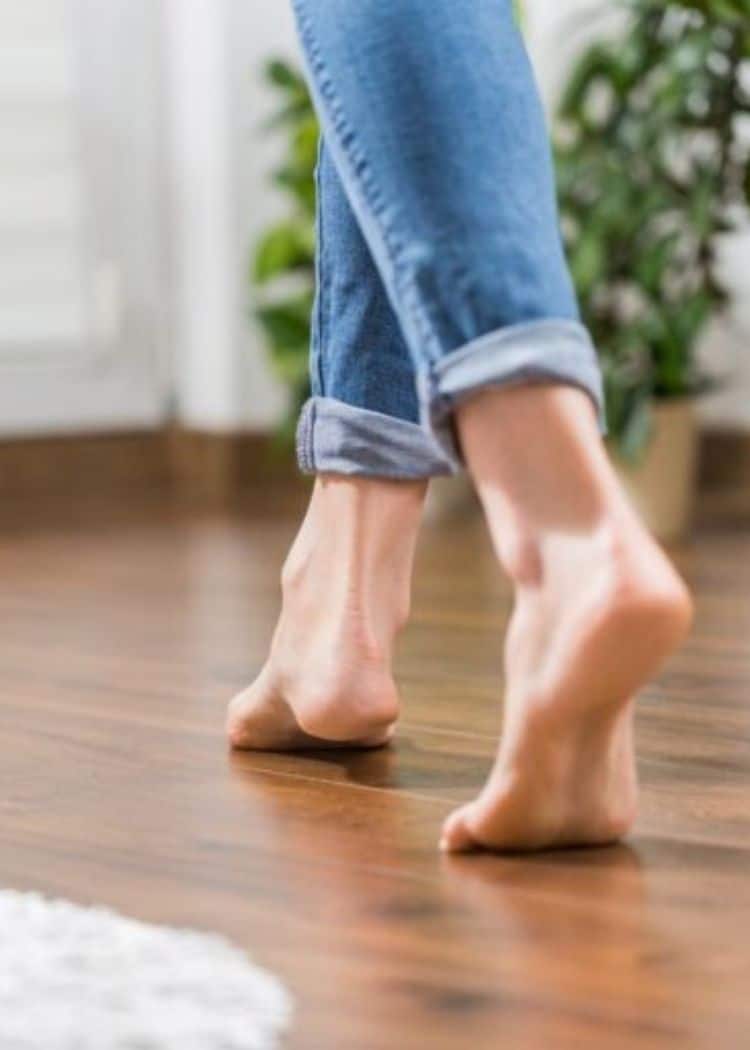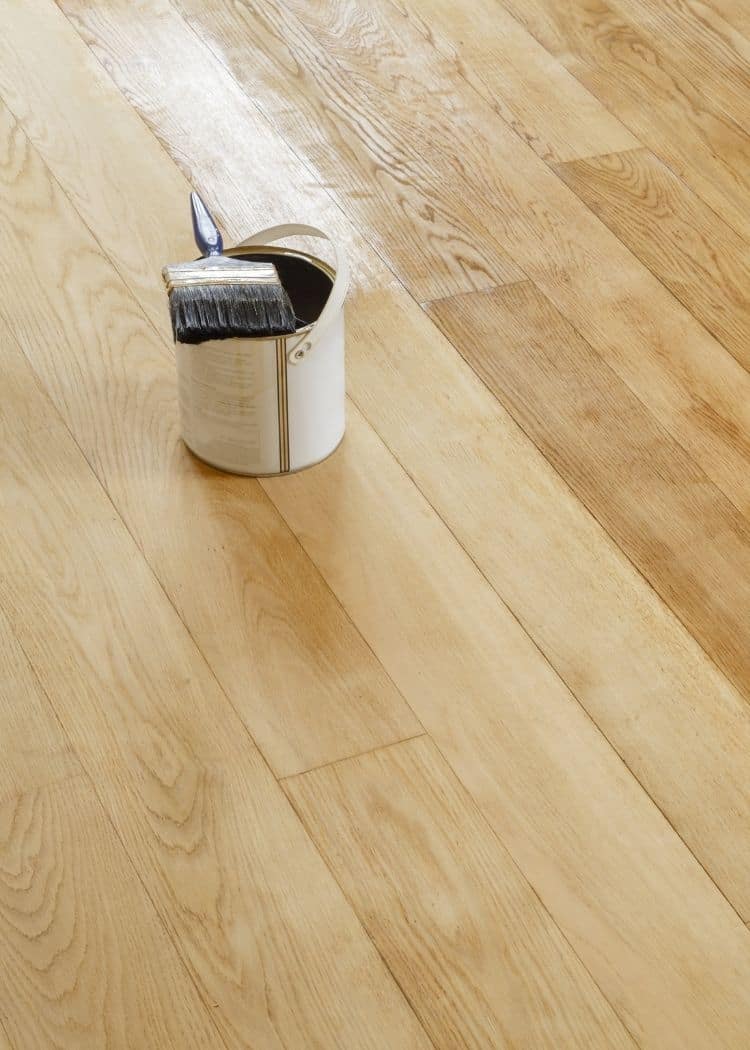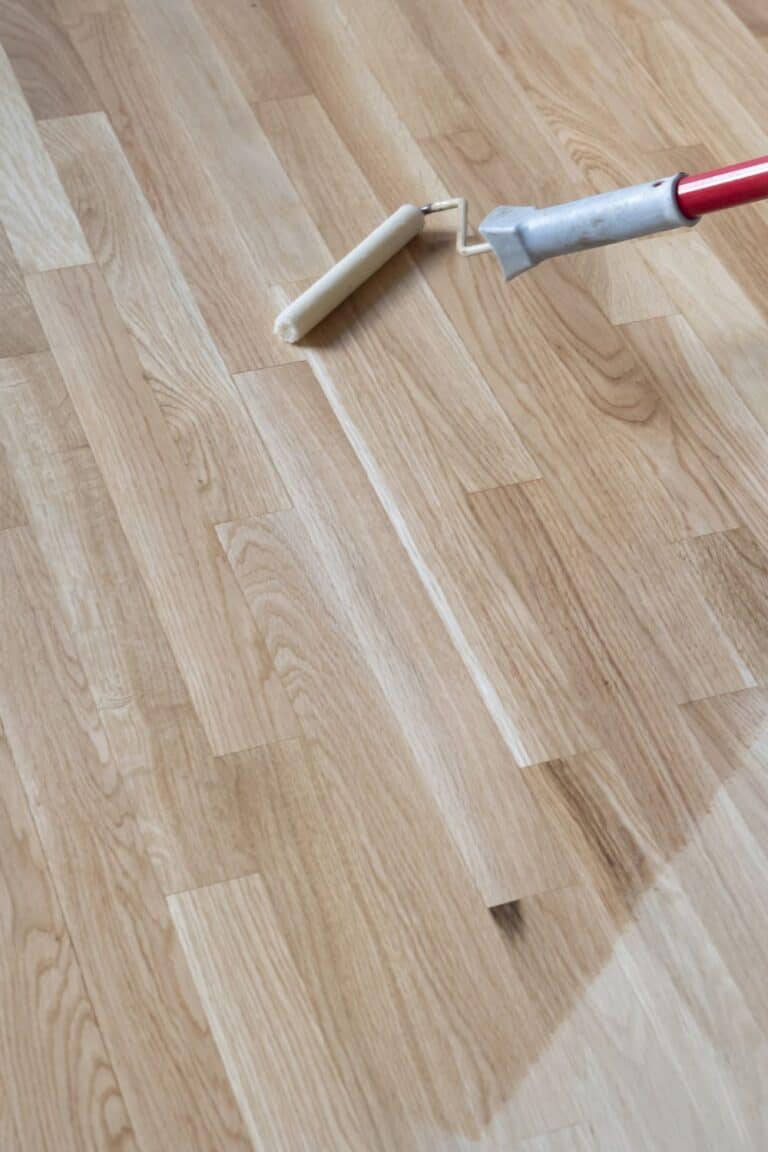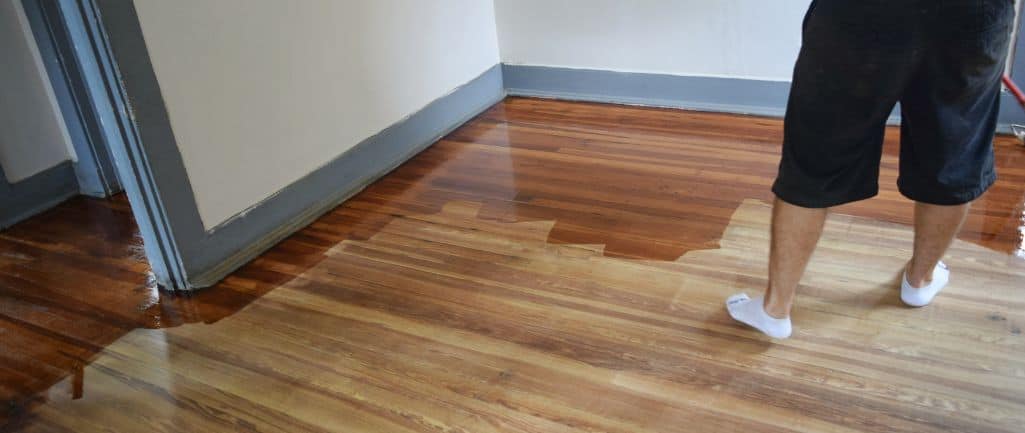
Water Based VS. Oil Based Polyurethane Floor Finish Which Is The Better Option
When it comes to protecting and beautifying your wood floors, two of the most popular options are water-based and oil-based polyurethane finishes. Both types of polyurethane have their own set of pros and cons, and choosing between them can be a difficult task. We will discuss factors such as durability, curing time, odor, and environmental impact, so you can make an informed decision about the best polyurethane finish for your floors. Polyurethane is by far the most durable of all options on the market and has been used across the globe.
Each type of polyurethane has its own set of advantages and disadvantages. Water-based polyurethane is more eco-friendly and has less of an odor, but it is also more susceptible to scratches and water damage. Oil-based polyurethane is more durable and lasts longer, but it is also more toxic and difficult to apply.
So, which should you choose? It really depends on your specific needs and preferences. My personal preference is oil-based. At the end of the day, I absolutely love the rich dark tones that it provides. It simply can’t be beaten.
In this blog post, we will take a closer look at the differences between water-based and oil-based polyurethane floor finishes, and help you decide which one is the better option for your specific needs.
Water Based Polyurethane
The pros of water-based polyurethane
- One of the biggest advantages of water-based polyurethane is that it is much more eco-friendly than oil-based polyurethane.
- It is also less toxic, which makes it safer to use in your home.
- Water-based polyurethane is also easier to apply than oil-based polyurethane.
- It dries much faster than oil-based polyurethane. This is because the water evaporates quickly, leaving behind the polyurethane finish. This can be a big advantage if you are short on time or if you need to use the floor right away.
- Water-based polyurethane also has a much less strong odor than oil-based polyurethane. This is because the chemicals in water-based polyurethane are less volatile, which means they don’t produce as strong of an odor.
- The final advantage of water-based polyurethane is that it is much easier to clean up than oil-based polyurethane. You can simply use soap and water to clean up any spills or drips.
The cons of water vs oil based polyurethane for floors
- One of the biggest disadvantages of water-based polyurethane is that it is not as durable as oil-based polyurethane. This is because the water can cause the polyurethane to swell and shrink, which makes it less resistant to damage.
- Water-based polyurethane is also more susceptible to scratches and water damage than oil-based polyurethane. This is because the water in the polyurethane can seep into the wood and cause it to swell.
- Another disadvantage of water-based polyurethane is that it can yellow over time. This is because the UV rays from the sun can cause the water in the polyurethane to evaporate, which leaves behind a yellowish residue.
- The final disadvantage of water-based polyurethane is that it is not as effective at sealing out moisture as oil-based polyurethane. This means that it is not the best choice for floors that are subject to a lot of moisture, such as kitchens and bathrooms.

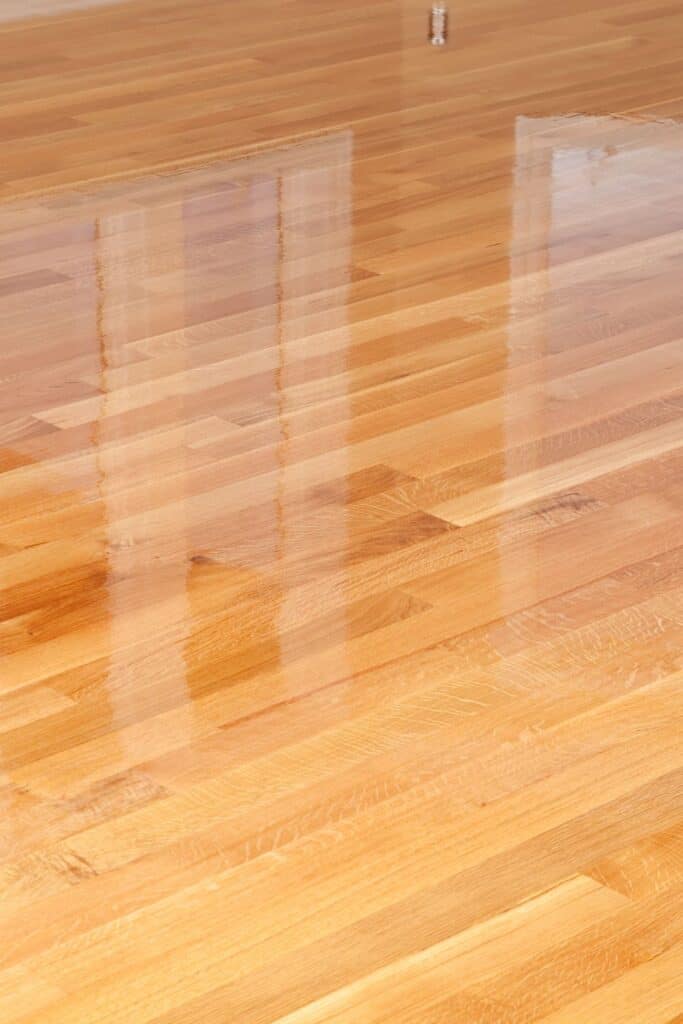
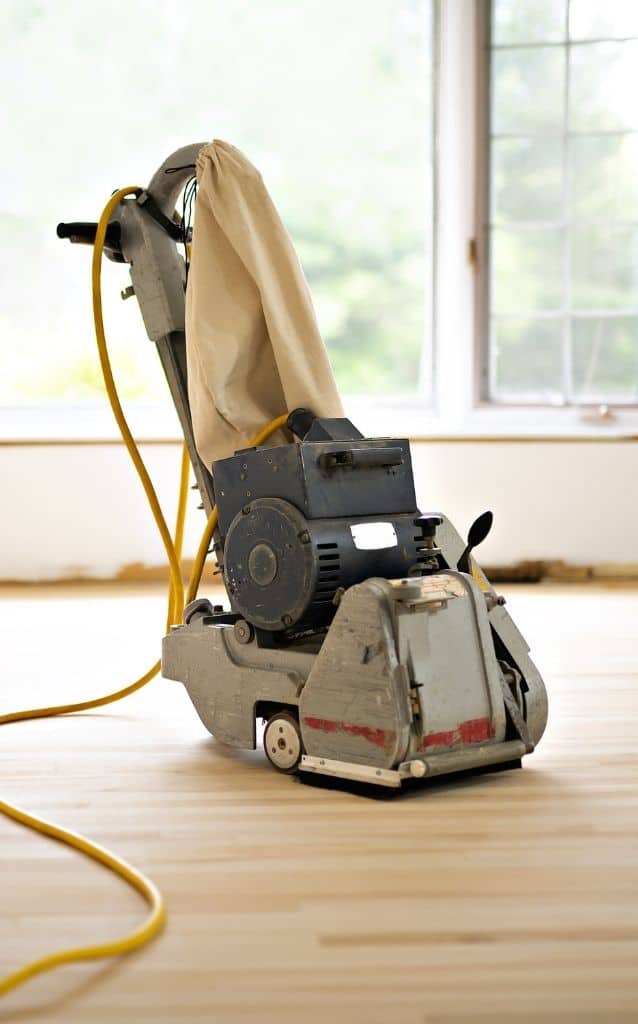

Oil-Based Polyurethane
The pros of oil-based polyurethane
- One of the biggest advantages of oil-based polyurethane is that it is much more durable than water-based polyurethane. This is because the oil creates a harder finish that is less susceptible to damage.
- Fewer coats than water-based
- Oil-based polyurethane is also much better at sealing out moisture than water-based polyurethane. This makes it the better choice for floors that are subject to a lot of moisture, such as kitchens and bathrooms.
- Contains roughly 45 – 50% more solids, which provides a more protective finish.
- Another advantage of oil-based polyurethane is that it dries to a much higher gloss than water-based polyurethane. This can give your floors a shiny, polished look.
- Less maintenance.
- Provides a distinctive amber glow.
- The final advantage of oil-based polyurethane is that it is available in a variety of colors. This gives you the ability to match the polyurethane to the color of your floors.
The cons of oil-based polyurethane
- One of the biggest disadvantages of oil-based polyurethane is that it is much more toxic than water-based polyurethane. This is because oil is derived from petroleum, which is a toxic substance.
- Oil-based polyurethane is also more difficult to apply than water-based polyurethane. This is because the oil is thicker and more difficult to spread evenly.
- Another disadvantage of oil-based polyurethane is that it has a strong odor. This is because the oil is very volatile, which means it gives off a strong smell.
- The final disadvantage of oil-based polyurethane is that it takes much longer to dry than water-based polyurethane. This can be a big inconvenience if you are short on time or if you need to use the floor right away.
Which is the better option for you?
The best option for you depends on your specific needs and preferences. If you are looking for a more durable finish, then oil-based polyurethane is the better choice. However, if you are looking for an eco-friendly option that is easier to apply and has a less strong odor, then water-based polyurethane is the better choice.
Here Are Our Number One Choices For Both Water-Based Poly And Oil-Based Poly
Bona Traffic tops off the list in our #1 spot for water-based poly. Zar is our choice for oil-based poly. You can find a complete list of the Best Polyurethane For Hardwood Floors right here.
#1 Bona Traffic HD High Grade
Bona is at the top of the list and is considered one of the best water-based polyurethane available. It is commercial grade and highly durable. Bona Traffic HD is a water-based polyurethane that is designed for heavy-traffic areas. It is scratch-resistant and has a satin finish that is easy to clean.
#1 ZAR 33912 Oil Based Polyurethane Wood FinishZAR®
Interior Oil Base Poly is fast-drying, oil–based polyurethane that dries to a smooth finish on bare wood, in just two hours, with no brush marks.
What Is The Best Hardwood Floor Finish For Dogs
Hands down I suggest oil or a wax-based matte finish. Your oil base will hide dirt, and small scratches better than a water-based finish. In addition, the oil is also going to penetrate the grain of the wood, thus you will have a nice clean finish without your floor having a super thick film on it.
How To Tell If Polyurethane Is Oil Or Water-Based
Here are a few simple ways to tell the difference:
-Oil-based polyurethane will have a strong chemical smell, while water-based polyurethane will have little to no smell.
-Water-based polyurethane will be thinner and less viscous than oil-based polyurethane.
-Oil-based polyurethane will take longer to dry than water-based polyurethane. fewer fumes than oil-based polyurethane.
Summary Comparison of Water vs. Oil Based Polyurethane
Shine
Oil Based: Gives you a much better shine
Water Based: Less shine, more of a satin finish.
Color
Oil Based: Beautiful rich amber color and will naturally darken over time. Do not use oil-based poly on light color wood as it will yellow the wood.
Water Based: The natural color of the wood will shine through. It’s a clear coat. It will work best on light-colored and gray-toned hardwoods.
Required Coats:
Oil Based: Minimum of 3 coats, thus you have 3 different days that you can apply the polyurethane. You have to wait 24 hours between each coat.
Water Based: Minimum of 3 coats if you are willing to spend the money and go with Bona Traffic. 4 Coats with any other product. As you can see, you aren’t saving money with a cheaper product as you will need to do more coats of polyurethane.
Ease Of Application
Oil Based: You could try and tackle this on your own as the drying time is substantially longer than with water based. This gives you time to fix and correct your mistakes. None the less I would still leave it to the professionals.
Water Based: I would not recommend that you make this a DIY project. Leave it to the professionals. If you mess up, it’s messed up and hard to correct. The polyurethane dries rather quickly and you run the chance of leaving bubbles and streaks. Spend the money and hire a professional.
Dry Time
Oil Based:
24 Hours per coat, and 24 hours before you walk on it. Two days before you put any furniture back on it. Hold off for at least 3 days before you return home after the last coat. (You absolutely can not be in the house. The fumes are dangerous with a capital D.
Water Based: Can take anywhere from 2.5- 3 hours between coats. You should wait a minimum of 24 hours before you walk on it and 72 hours before you return any furniture. You can remain in the home while all of this is taking place, none the less if you have somewhere else to go, now would be a great time to find other things to do outside the home.
VOC/Odor
Oil Based: Extremely pungent and toxic. The area has to be vacated for several days. Worker must wear protective ventilation to apply. Now would be a good time to schedule a mini vacation. If you are purchasing a home and plan to have the floors redone, I highly suggest that you consider having them done prior to moving in.
Water Based: Earth-friendly and has very low VOC when compared to oil-based. You can remain at home, but I still suggest you spend the day at the mall.
Durability
Oil Based:10+ years if not longer. In all honestly, I’ve come across homes with original hardwood floors that were oil-based and they look stunning. 30+ years.
Water Based: 10+ years as well, however, if you go with a cheaper product, you will not see the longevity you would see with Bona products. And you normally get less usability when you don’t use a professional.
Clean Up
Oil Based: paint thinner, turpentine, and mineral spirits.
Water Based: Soap & Water
📌Here is a list of all the cleaning products that I highly suggest. At the top of the list is my choice of the best steam mop, vacuum cleaner for hardwood floors, and my favorite hardwood floor cleaner. You can view all my recommendation on our Hardwood Floors Cleaning Page.
Frequently Asked Questions – FAQS
Is it better to use water based or oil based polyurethane?
It depends on the desired outcome. Water-based polyurethane dries quickly, is low odor, and does not yellow over time, making it a good choice for light-colored woods or surfaces that will be painted. Oil-based polyurethane has a longer curing time, but produces a harder and more durable finish that is better suited for darker woods and surfaces that will be exposed to heavy use or wear. Ultimately, the choice between water-based and oil-based polyurethane will depend on the specific project and the desired final result.
What is the main disadvantage of using water based polyurethane?
One main disadvantage of using water-based polyurethane is that it is not as durable as oil-based polyurethane. It is also less resistant to scratches and other forms of wear and tear. Additionally, water-based polyurethane can raise the grain of the wood, giving it a rough texture, and it may also be more susceptible to damage from water and other liquids. Furthermore, it is not as good as oil-based polyurethane in terms of resistance to UV and yellowing over time.
What lasts longer oil or water based polyurethane?
Oil-based polyurethane generally lasts longer than water-based polyurethane. Oil-based polyurethane has a harder and more durable finish, making it more resistant to scratches, wear and tear, and other forms of damage. Oil-based polyurethane also tends to be more resistant to UV light and yellowing over time.
It’s worth noting that the durability of polyurethane finishes also depends on the surface it is applied to, the amount of wear and tear the surface will be exposed to, and the number of coats applied. In general, oil-based polyurethane will provide a longer-lasting finish, but it is also more difficult to apply and has a stronger odor and longer drying time.
Resources
Here are some complimentary flooring tools that you may want to invest in that will protect your floors after you have completed this flooring project.
Useful Hardwood Flooring Information
Do your research and decide which one works best for your situation. Always make sure that you are cleaning your hardwoods properly and keep them free of dirt and debris.
Quick Tip #6 – Oil & Water Based Polyurethane – Which is Better
Alternatives To Polyurethane
Hands-down polyurethane is the most popular way to finish and protect your floors. Here are several alternatives.
- Varnish- is old school and pre-dates polyurethane. It is made from the sap of wood mixed with alcohol. It produces a much thicker coating
- Penetrating Oil -I use a version of penetrating oil on my deck. When it comes to your hardwood floors, you will need to put down several coats… It is great for repelling what, however, it does not offer the same protection as polyurethane does when it comes to scratches.
Aluminum Oxide (Pre-finish) – It’s amazing but it must be applied at the factory, hence your floors will already come with aluminum oxide applied. It is not something you can go and pick up from Lowes or Home Depot. - Wax- You have to spread the wax several times (thin coats after you have stained the flooring) Then you must buff the floor to achieve the high gloss look. I can remember having to buff floors when I was in the army. It is not for the faint of heart.
Final Thoughts
Each type of polyurethane has its own set of advantages and disadvantages. Water-based polyurethane is more eco-friendly and has less of an odor, but it is also more susceptible to scratches and water damage. Oil-based polyurethane is more durable and lasts longer, but it is also more toxic and difficult to apply. The best option for you depends on your specific needs and preferences. If you are looking for a more durable finish, then oil-based polyurethane is the better choice. However, if you are looking for an eco-friendly option that is easier to apply and has a less strong odor, then water-based polyurethane is the better choice.

If you found my tips & advice useful and helpful, then feel free to buy me a cup of coffee and support my blog!
Related Hardwood Flooring Post
- Flooring Trends In 2022: What the Experts Are Saying
- Best Polyurethane Brands For Floors
- How To Remove Urine And Pet Odors From Hardwood Floors
- Top Recommended Hardwood Cleaning Products And Supplies



